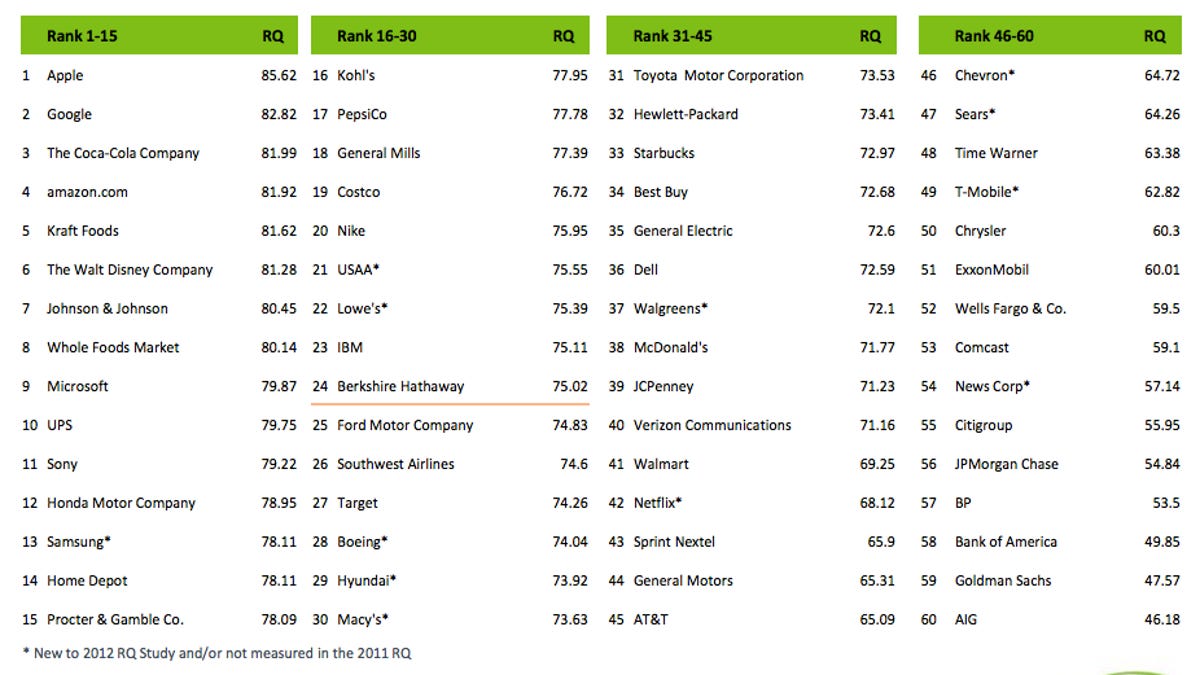Apple dethrones Google as most reputable company
Reputation of Apple and Amazon rises while that of many corporations, especially banks, falls in the eyes of the U.S. public, survey finds.

Apple has charged ahead of Google in brand reputation, jumping from fifth place last year to No. 1 this year, according to a U.S. consumer survey released today.
Apple has the highest score in the 13-year history of the study by Harris Interactive and beats all the other companies in four of the six key reputation areas: financial performance, products and services, vision and leadership, and workplace environment. Whole Foods was top ranked for social responsibility and Amazon.com for emotional appeal.
The Reputation Quotient (RQ) for Apple is 85.62 and for Google, 82.82. Rounding out the top 10 are Coca-Cola, Amazon.com, Kraft, Walt Disney, Johnson & Johnson, Whole Foods, Microsoft, and UPS. The rankings and score of all 60 most visible brands is available in PDF form.
Apple's trajectory contrasts sharply with that of HP in the Harris Poll Reputation Quotient study. HP started out in third place in 2000, was in the 25th spot last year, and is now in 32nd place.
What a difference a decade makes. Apple used to be among the bottom companies in terms of reputation, ranking 34th in 2000 and 40th in 2001. The company has steadily risen since, reaching fourth place last year as it offered more popular products and its finances improved. It benefits from being a hybrid company, selling software and hardware products as well as having retail stores, said Robert Fronk, executive vice president and global corporate reputation practice lead for Harris Interactive.
But things aren't all rosy for Apple, particularly given complaints of poor working conditions at the Foxconn plant in China where some of its products are made, contributing to employee deaths and suicides. The company, which has borne the brunt of much of the criticism despite being just one of many tech firms that contract manufacturing out to Foxconn, is asking the Fair Labor Association to investigate conditions at Foxconn plants.
Amazon.com, meanwhile, is the highest trusted company in the study and is considered as having high ethical standards and being transparent, Fronk said.
Not making the list at all was Facebook. "They have no connection right now with consumers. They are (considered) a functional tool I use to accomplish something else," he said. "They so lack in the emotional appeal attributes. They are strong in financial performance, but lack in the areas that form a more solid reputation foundation."
Part of the problem for Facebook is its missteps on privacy matters, something that dogs Google too, according to Fronk.
"When you talk about trust, one of the behavioral metrics we look at is trust to do the right thing," he said. "More than 25 percent of respondents say they do not trust Facebook to do the right thing. The whole notion around aggregating my life in order to be able to sell who I am to someone else to try to sell more to me is clearly going to be in the forefront of how those companies are perceived."
In the list of 60 companies, for which more than 17,000 consumers were asked to name the two most visible companies, there are 10 that are tech or Internet firms: Apple, Google, Amazon.com, Microsoft, Sony, Samsung, IBM, HP, Dell and Netflix, which is on the list for the first time, ranked at spot 42. Five firms on the list are in the telecommunications industry: Verizon, Sprint Nextel, AT&T, T-Mobile, and Comcast.
"Telecom firms are and have traditionally been at the absolute bottom of our list," mostly because they are seen as being the service provider and they suffer by being associated with the customer service challenges of the industry, Fronk said.
The biggest declines in ranking were five financial institutions: Bank of America, Berkshire Hathaway, Wells Fargo, Goldman Sachs, and JP Morgan Chase, followed by AT&T. "The general public believes that Bank of America has been more concerned with operational and financial recovery than with customers, and rates the bank low in levels of trust, ethics, and customer service," the Harris Interactive news release said.
Faith in corporate America, in general, has taken a hit over the past year, reflecting the anti-corporate sentiment of the Occupy Wall Street movement and disillusionment over the lack of concern for consumer welfare following the Wall Street bailout. Only two in 10 Americans have a positive perception of corporate reputation as it stands now. Meanwhile, the number of companies with Reputation Quotient scores of 80 or higher has been reduced by half in the last year, the study shows.

